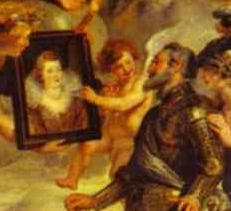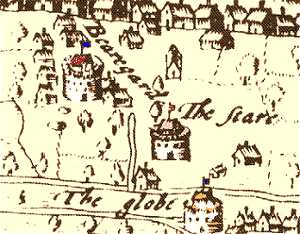Current Events
March 15, 1600
Nearly 40 years of civil war officially ended in 1598 with the Peace of
Vervins and religious toleration was officially established with the Edict
of Nantes the same year. Not everyone in the entire country is completely
happy with the new order -- some extreme Protestants feel that the didn't
get as much as they deserved after supporting Henri IV for so many years,
and some extreme Catholics can't stomach the idea of treating Protestants
as social equals. But overall, the mood of the country is optimistic and
the process
of rebuilding is underway.
Henri IV and his superintendant of finances, Maximilien Bethune, currently
Baron de Rosny and eventually to become Duc
de Sully, are busy re-establishing royal authority and enthusiastically
reforming taxation, economic policy, overseas trade, and agriculture.
 One of
the big items of speculation is what the king is going to do for a queen
and heirs to the throne. His marriage to Marguerite de Valois, which was
the occasion of the great St. Bartholemew's Day Massacre in 1572,
was childless and she has been in a kind of internal exile in the Auvergne
since 1582. He obtained a divorce in 1599, which caused much speculation
that he was planning to marry his mistress, Gabrielle d'Estrées
(with whom he already had several children), but she died suddenly of convulsions
during her fourth pregnancy on Holy Saturday (the day before Easter) in
1599. The king seems to have expressed his grief with a fit of wenching,
and his new mistress is Henriette d'Entragues, a gold-digging schemer if
there ever was one. Parliament and other dignitaries have been begging
him to find a more suitable princess. One of the possible candidates is
Marie de' Medicis, niece of the Grand Duke of Tuscany.
One of
the big items of speculation is what the king is going to do for a queen
and heirs to the throne. His marriage to Marguerite de Valois, which was
the occasion of the great St. Bartholemew's Day Massacre in 1572,
was childless and she has been in a kind of internal exile in the Auvergne
since 1582. He obtained a divorce in 1599, which caused much speculation
that he was planning to marry his mistress, Gabrielle d'Estrées
(with whom he already had several children), but she died suddenly of convulsions
during her fourth pregnancy on Holy Saturday (the day before Easter) in
1599. The king seems to have expressed his grief with a fit of wenching,
and his new mistress is Henriette d'Entragues, a gold-digging schemer if
there ever was one. Parliament and other dignitaries have been begging
him to find a more suitable princess. One of the possible candidates is
Marie de' Medicis, niece of the Grand Duke of Tuscany.
Meanwhile, there is some indication that matters may be heating up in
Savoy.
One of the terms of the 1598 treaty was papal abitration of the Marquisate
of Saluzzo, which had been under French control and was seized by the Savoyards
in 1588. The pope was not up to the task, and the Duke of Savoy came to
the French court at the end of last year to negotiate the matter. He has
just left Paris with an agreement that he will turn over Saluzzo by June
1, or else Bresse and some other territories. This peace agreement is already
on its way to being broken.
 In England, the
Queen's favorite, the Earl
of Essex was sent to Ireland in 1599. He failed to make any headway
against the Irish rebels, signed an unapproved treaty with the Earl of
Tyrone, and upon return to England at the end of the summer was imprisoned
in the Tower. He is still awaiting trial and there is much speculation
about his fate.
In England, the
Queen's favorite, the Earl
of Essex was sent to Ireland in 1599. He failed to make any headway
against the Irish rebels, signed an unapproved treaty with the Earl of
Tyrone, and upon return to England at the end of the summer was imprisoned
in the Tower. He is still awaiting trial and there is much speculation
about his fate.
The Globe
Theater opened in London this past summer. Thomas Platter, the
Swiss medical student and diarist, saw a production of Julius Caesar
there
this past September and Master Knowlton was able to catch the production
of Master Shakespeare's History of Henry V. He declares it his favorite
play because he recognizes so many of the characters in it from his days
in the wars. He's fond of going around reciting "no tittle tattle and prittle
prattle in Pompey's camp."
Dutch opticians are working on the telescope.
Johannes
Kepler is forced to leave Graz due to religious persecution of
Protestants and is serving as Tycho Brahe's assistant in Prague.
Galileo
figures out that light, "if not instantaneous, is extraordinarily rapid."
Rubens is painting in Italy, Caravaggio is producing his
sensuous chiaroscuro works.
Giordano Bruno
was
burnt at the stake in Rome on February 17 for his radical views about the
infinity of inhabited worlds in the universe and his obnoxious personality.
 One of
the big items of speculation is what the king is going to do for a queen
and heirs to the throne. His marriage to Marguerite de Valois, which was
the occasion of the great St. Bartholemew's Day Massacre in 1572,
was childless and she has been in a kind of internal exile in the Auvergne
since 1582. He obtained a divorce in 1599, which caused much speculation
that he was planning to marry his mistress, Gabrielle d'Estrées
(with whom he already had several children), but she died suddenly of convulsions
during her fourth pregnancy on Holy Saturday (the day before Easter) in
1599. The king seems to have expressed his grief with a fit of wenching,
and his new mistress is Henriette d'Entragues, a gold-digging schemer if
there ever was one. Parliament and other dignitaries have been begging
him to find a more suitable princess. One of the possible candidates is
Marie de' Medicis, niece of the Grand Duke of Tuscany.
One of
the big items of speculation is what the king is going to do for a queen
and heirs to the throne. His marriage to Marguerite de Valois, which was
the occasion of the great St. Bartholemew's Day Massacre in 1572,
was childless and she has been in a kind of internal exile in the Auvergne
since 1582. He obtained a divorce in 1599, which caused much speculation
that he was planning to marry his mistress, Gabrielle d'Estrées
(with whom he already had several children), but she died suddenly of convulsions
during her fourth pregnancy on Holy Saturday (the day before Easter) in
1599. The king seems to have expressed his grief with a fit of wenching,
and his new mistress is Henriette d'Entragues, a gold-digging schemer if
there ever was one. Parliament and other dignitaries have been begging
him to find a more suitable princess. One of the possible candidates is
Marie de' Medicis, niece of the Grand Duke of Tuscany.
 In England, the
Queen's favorite, the
In England, the
Queen's favorite, the 